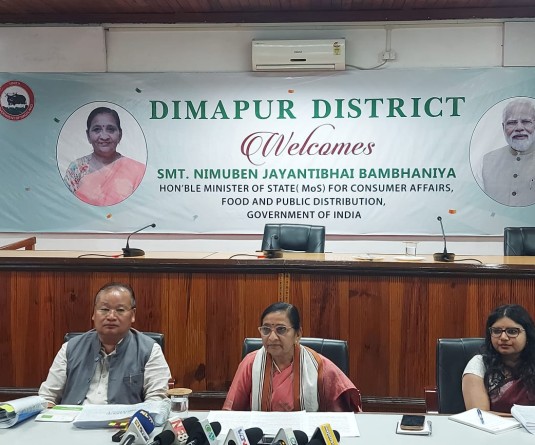
Urges for concerted effort to break down physical and attitudinal barriers
Kohima, November 3 (MExN): The Nagaland State Disability Forum (NSDF) has expressed deep disheartenment over what it termed “inaccessibility and insensitivity” displayed towards Persons with Disabilities (PwDs) during a recent event in Kohima.
“This incident highlights the much larger issue of the continued marginalisation of Persons with Disabilities in our state,” the Forum asserted in a statement.
According to the NSDF, the event was the launch of the coffee table book Weaving Dreams – A Tribute to Inspiring Women of Nagaland, produced by the State’s SDG Coordination Centre (SDGCC). However, the venue of the event was shockingly inaccessible to one of the women featured in the book: Diethono Nakhro, the State Commissioner for Persons with Disabilities (SCPD), Nagaland.
Despite being invited and honoured in the book as an ‘inspiring’ woman, she was denied the basic dignity of attending the event due to the venue’s lack of accessibility. What should have been an occasion to celebrate inclusivity instead turned into a painful reminder of the pervasive exclusion faced by PwDs in Nagaland, the Forum added.
As Nakhro herself highlighted in her social media post, this was not an isolated case, but a reflection of the everyday reality for disabled people across the state, the Forum stated. Her contention that “inaccessibility and exclusion are not occasional mishaps but the norm in our society” echoed the experiences of many PwDs in the state, it asserted.
Accessibility not a favour
The NSDF also pointed out that one of the more troubling aspects of the incident was that the event was organised by the SDG team, a group committed to achieving the Sustainable Development Goals, which explicitly include disability inclusion under the principle of “leave no one behind.” The failure to provide a basic accessible venue for such a high-profile event calls into question the seriousness of these commitments, it said.
Accessibility is not a favor to be gifted to individuals; it is a right guaranteed under the law, specifically the Rights of Persons with Disabilities Act (RPwD), 2016, it added. Accordingly, the NSDF termed the incident a clear violation of the RPwD Act, which mandates barrier-free environments and access to all public spaces, while highlighting the wider issue of non-compliance with this legislation across the state.
Public spaces in Nagaland, including government buildings, educational institutions, and event venues, remain largely inaccessible, excluding a significant portion of the population from participating fully in social, cultural, and economic life, it said. This incident serves as a strong reminder of the work that still needs to be done to make Nagaland an inclusive and equitable state, it added.
The Forum noted that while apologies are appreciated, they are insufficient. “What is needed is action that ensures all public spaces are accessible and that Persons with Disabilities are included in every aspect of public life, from policy-making to event planning,” it declared.
To this end, the NSDF called on the Government of Nagaland, the SDG Coordination Centre, and all public and private establishments and organizations to take immediate steps to address the systemic exclusion of the disabled community. This includes enforcing the provisions of the RPwD Act, ensuring that all future events are held in accessible venues, and implementing policies that promote the inclusion of disabled individuals at every level of society, it said.
The Forum also urged the wider public to reflect on their role in promoting accessibility and inclusion. True inclusivity requires more than just acknowledging the presence of PwDs; it requires a concerted effort to break down the physical and attitudinal barriers that prevent them from fully participating in society, it held.
It is not enough to celebrate the achievements of PwDs without ensuring they have the same opportunities to access the spaces and platforms that others do, it highlighted.
Citing Nakhro, “We need action, not apologies,” the NSDF stated that it is high time for Nagaland to move beyond symbolic gestures and start implementing real, lasting change that ensures PwDs are not just included in name, but in every aspect of society. Accessibility is a basic human right, and it is long overdue for Nagaland to make good on its commitments to uphold that right, it said.
The NSDF also conveyed its solidarity with Nakhro and all PwDs in demanding accountability and concrete steps towards a more inclusive, accessible, and just society. “It is time for Nagaland to walk the talk on disability inclusion.”





